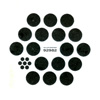 It seems that I badly underestimated William Basinski, as I stopped following his career several years ago out of frustration with his apparent creative stagnation.  His methods and conceptual underpinnings have certainly evolved steadily, but it seemed like the end result was always something murky, free-floatingly melancholy, and endlessly repeating, regardless of how he got there.  Then I heard this 2009 album and was unexpectedly floored.  Basinski seems to have found whatever it was that he was missing.
It seems that I badly underestimated William Basinski, as I stopped following his career several years ago out of frustration with his apparent creative stagnation.  His methods and conceptual underpinnings have certainly evolved steadily, but it seemed like the end result was always something murky, free-floatingly melancholy, and endlessly repeating, regardless of how he got there.  Then I heard this 2009 album and was unexpectedly floored.  Basinski seems to have found whatever it was that he was missing.
Or maybe he had it and lost it.  It is difficult to say, as the first three pieces here were all recorded way back in 1982.  All on the same night, actually, which is where the album derives its seemingly cryptic title (the fourth piece is a recent composition using the same source material).  Curiously, the nearly-as-excellent Vivian & Ondine (also from 2009) similarly cannibalized old compositions to great success.  At the very least, William definitely seems to be extremely adept at choosing what to revisit and release these days.  Obviously, such tactics are nothing new for Basinski (artfully re-purposing his past work is arguably the basis for his entire career), but 92982 differs from his other "recent" work in some very subtle, yet very important ways.  Naturally, the closest touchstone for these lengthy, slow-moving ambient washes of distressed and damaged tape loops is William's career-defining Disintegration Loops series.  At the risk of sounding heretical, I would say that he easily surpasses that high-water mark here.  In any case, he has certainly found a way to make his work in that vein more engaging.
Being a William Basinski album, 92982 is characteristically still pretty blurry and suffused with sadness, but the loops have a bit more of a distorted physicality than usual.  That seems like such a minor difference, but it gives the pieces a heightened presence–there's some definite heft and grittiness here that I usually find lacking in William's work.  The other, more unexpected, innovation is that Basinki recorded the original tapes with the windows open in his studio.  I can't possibly overstate how vital that seemingly trivial quirk is to the success of these pieces: it changes everything.
In the most obvious sense, the ambient Brooklyn sounds (sirens, helicopters, fireworks,etc.) that subtly drift in and out of the fog make everything seem a bit more unpredictable, mysterious, and dynamically satisfying.  The pieces are no longer mere haunting loops that glacially wax and wane for twenty minutes, but instead feel like thoughtful compositions with unconventional crescendos ("Shhhh...here comes the ambulance–this is my favorite part!").  Less obviously, allowing the sounds of the world outside to seep into the music also makes it seem much more organic and alive.  Most important of all, however, is this: on a deeper level, having such a sense of place and time makes 92982 feel like an extended love song/elegy for both a city and an entire era of Basinski's life.  They don't just sound good–these pieces have some serious emotional resonance of the "bittersweetly heartbreaking" variety.
In a way, 92982 is a perfectly realized collision between The Disintegration Loops and John Cage's "4'33"."  It narrowly misses being a perfect album though, as it arguably would have been better if it had ended after the achingly beautiful and gently swaying first half.  The argument: I'm a bit conflicted by the third piece, "92982.4," simply because it doesn't feel like it relates thematically to the pieces that precede it.  Taken by itself, however, it is quite good (if a bit overlong): a fragile, dark, and tirelessly repeating piano loop unfolds for 20 minutes as the accumulated overtones oscillate and clash uncomfortably below it.  It sounds like either a sun-warped Morton Feldman record or one of Erik Satie's nightmares.  The closing "new" piece is deeply exasperating though, as it is essentially just a sterilized version of the opening piece with all the hiss, grit, and life removed.  It's still a fine composition, but the fact that Basinki made an ill-advised cosmetic "improvement" upon something that was already perfect makes me wonder if he fully understands and appreciates what a stellar album his brilliant 1982 self made.
Samples:
 
 
Read More


